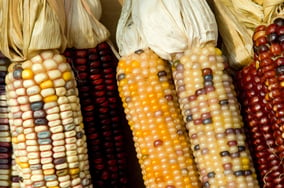Originally published : Fri, February 10, 2017 @ 4:42 PM
Updated : Wed, February 15, 2017 @ 4:23 PM

Demand for maize is increasing due to an increased number of people transitioning to meat-based diets driving demand for animal feed. Drought has been identified as the number one factor in impacting maize yields in the region. Over 80% of maize grown in tropical Asia is rainfed, leaving the 19 million hectares of maize subject to stress caused by variations in monsoon rains. As such, maize is a good point of reference when thinking about the importance of production of drought-tolerant crops (Zaidi, et al., 2016).
Traditionally, maize producers in Asia have focussed on developing crops with high yield and biotic stress resistance e.g. resistance to Maize Streak Virus. Unfortunately, this has meant there has been less emphasis on reducing the impact of abiotic factors such as drought and heat tolerance.
Maize is the second most important cereal crop in Asia (Pasuquin, et al., 2007), and demand is set to double by 2020 (Prasanna).
This has given significant impetus to the development of drought-tolerant maize strains to cultivate in the region.
To accelerate the discovery of varieties that exhibit the maximum genetic gain achievable, plant breeders have turned to genomic selection techniques to enable them to study high-density genomic markers across large numbers of samples.
A recent paper published by Vivek et al demonstrates how genomic selection can result in rapid genetic gains for drought-tolerance in maize.
- White maize lines produced in Africa and Mexico, which have high drought tolerance, were crossed with two elite yellow maize lines produced in Asia.
- Parents of promising CIMMYT-Asia populations were surveyed for polymorphisms with 1214 SNP markers using KASP® genotyping services provided by our lab in Hoddesdon, UK.
- High genomic- estimated breeding values derived from test-crossing phenotypes led to the generation of two lines with increased grain yields
This highlights how new approaches can be used to develop lines more tolerant to drought conditions and reduce impacts on yields. [Such research achievements shed reassuring light on the progressive role of genomics in breeding beneficial traits into crops.
Learn More
- Read the paper: Vivek, B. S., et al. "Use of Genomic Estimated Breeding Values Results in Rapid Genetic Gains for Drought Tolerance in Maize." The Plant Genome (2016).
- Watch our series of videos explaining how KASP works and take a tour of our genotyping lab here: https://www.lgcgroup.com/products/kasp-genotyping-chemistry/genomics-lab-tour-and-videos/
- Find KASP assays, including for maize, wheat and rice, using our online Assay Search Tool.
References:
Pasuquin, J.M.C.A., & Witt, C. (2007). Maize in Asia and the global demand for maize. International Potash Institute, 3(14). Retrieved February 8 , 2017, from http://www.ipipotash.org/zh/eifc/2007/14/3/english
Prasanna, B. (n.d.). Molecular Marker-Assisted Breeding for Improving Stress Tolerance and Nutritional Quality of Maize [Scholarly project]. In International Maize and Wheat Improvement Center. Retrieved February 8, 2017, from http://ceg.icrisat.org/ngs/10_B%20M%20Prasanna_CIMMYT.pdf
Zaidi, P. H., Seetharam, K., Krishna, G., Krishnamurthy, L., Gajanan, S., Babu, R., . . . Vivek, B. S. (2016). Genomic Regions Associated with Root Traits under Drought Stress in Tropical Maize (Zea mays L.). Plos One, 11(10). doi:10.1371/journal.pone.0164340

